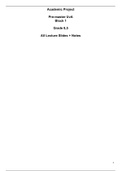Academic Project
Pre-master UvA
Block 1
Grade 8,5
All Lecture Slides + Notes
1
,WEEK 1 3
WEEK 2 11
WEEK 3 18
WEEK 4 28
WEEK 5 35
WEEK 6 46
2
,WEEK 1
Objectives of Academic Project include:
- Translating business problems into research questions and research objectives
- Locating academic literature and critically assessing its quality and relevance to a novel research endeavour
- Differentiating between the different philosophical perspectives that may be taken vis-à-vis (the generation of) knowledge
- Reflecting on importance of ethical considerations across all phases of the research process
- Gaining knowledge of and inisight into the design and conduct (qual and quant scientific business research)
- Analysis of such knowledge and insight in the analysis of published research and presenting the outcomes of this analysis
to your fellow students.
- Applying knowledge and insight of qualitative research to the conduct and wirting up of a group qualitative research
project.
1. Foundations of Research Methods
2. Ethics (will be addressed in the seminar)
Experience, experts, intuition or trial and error
Operationalization: take an abstract known as cheating. Turns it into something he can quantify which allows him to establish
relationships.
Ø Establishing relationships between variables.
X and Y
A difference on the dependent variable: cheating.
Causal relationship.
1. The nature of (business and management) research
- Research = Purposeful (to make things better. E.g. to reduce burnouts)
Systematic, Investigation, Empirical, Public Effort.
- Nature of Business and Management research: Transdisciplinary
- Double hurdle (theoretical and practical impact)
- Science- practice gap / translational research
- Evidence based management
Distinction in research is between basic research and applied research
Basic research:
Expand knowledge and results in principles (some law (if trustworthy))
e.g. intelligence in job applications.
> can be a longer timeframe
Applied research:
More focused on solving problems within particular organisation. Applied by people within this organisation, mostly not published.
Can be competitively sensitive. Results in quick solution to the problem.
e.g. hospital where many nurses drop out. Dept. manager has to figure out what the cause of these burnouts.
Ø Think of research as a continuum. Research finds answer to Curiosity or real life problem.
The Hourglass model
Starts with broad questions and narrows down. It observes these constructs in reality or ..
3
, Academic articles start with:
Title
Abstract
General (Introduction)
Specific (Methods Results = empirical and original part of your study/report)
Discussion
General
Hypothesis = a formal statement or expectation about what you expect to find.
e.g. if I do this, I expect people to do more… (movie)
we base our hypothesis on theory.
So first: theory > hypothesis > results > discussion > conclusion
Never read an article from start to end. Only look for specific information.
Don’t make search terms too specific.
You learn from literature review. Which variables they studied, whether it includes some control, certain measures for constructs.
We build on the research that has been done before us.
Good theory includes a plausible, coherent explanation for why a certain cause and effect relationship should be expected.
Agentic view of a career: you are good at this and this, if you continue like this, you will become like this…
Ø Critical note: there are external factors that influence these theories/views.
Inductive reasoning (Words, empirical approach, qualitative)
Tentative
Observation Pattern Theory
hypothesis
look for patterns in the data: what can be going on.
Once these patterns are identified, we start to form tentative hypothesis
Once we have these hypothesis, we start to form theories.
Categorize words into concepts > measurable and used as hypothesis.
Deductive reasoning (Numerical approach, quantitative) SPSS
Theory Hypothesis Observation Confirmation
operalization is always deductive to make it measureable.
Types of Data
- Qualitative data (build theory)
Data that are in the form of text, pictures, sounds
Difficult to conduct (difficult to generalize to the world) relies on subjective of the researcher.
- Quantitative data (test theory)
Data that is in numeric form
Causality as the ‘holy grail’ of research
“if I do this, this will happen”.
Causality is difficult to establish. The cause came earlier in time than the effect. And there should be an alternative influence.
- Quantitative Variable = anything that varies (age, gender, religion, time spent studying) this is measurable.
The numerical representation of some object
- Attribute = specific value of a variable (age: 1-114.., gender: male female,) specific values that variables can take on. >
these are often coded males: 0 female 1. Attributes on that variable.
A specific value of a variable
- Independent variable
4






